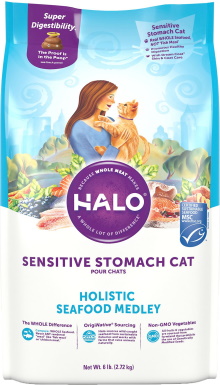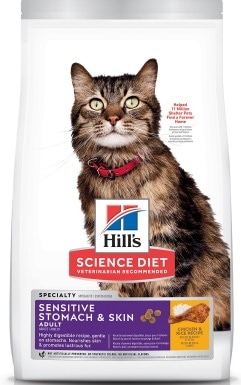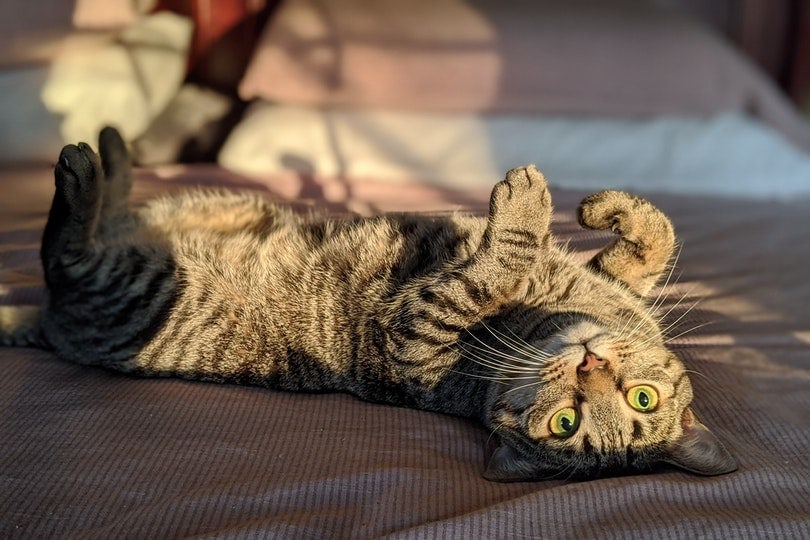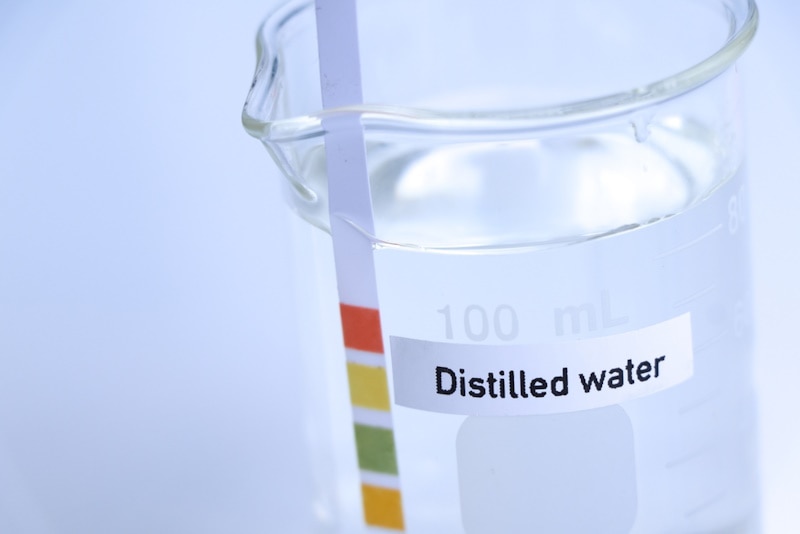11 Best Cat Foods for Sensitive Stomachs – 2024 Reviews and Top Picks
By Ed Malaker
Updated on
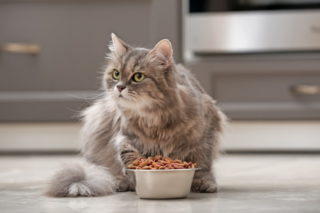
Many cats have sensitive stomachs and are prone to gas, soft, smelly poops, and diarrhea. If this sounds like your cat, one of the best ways to keep your cat regular is to change the brand of food you are feeding. However, with so many brands available, it can be difficult to sort through them all.
We’ve chosen 10 different brands to review for you so you can see the differences between them. We’ll tell you about the pros and cons we noticed about each brand and let you know if our cats liked them.
Keep reading while we look at ingredients and other factors that make suitable cat food for cats with sensitive stomachs so you can make an educated purchase.
Disclaimer: The foods reviewed here were chosen because they have certain characteristics that might help with some of the causes or consequences of this medical condition. However, they are not a medical treatment or a substitute for medical treatment. Keep in mind that each medical case is different and what works for some pets may not work for others. Your veterinarian is the right person to advise you on the best diet for your pet’s individual case.
A Quick Comparison of Our Favorites (2024)
| Rating | Image | Product | Details | |
|---|---|---|---|---|
| Best Overall |

|
Smalls Fresh Ground Cow Cat Food Subscription |
|
Click to Save 40% Use code: Hepper2023 |
| Budget Buy |

|
Halo Seafood Sensitive Dry Cat Food |
|
Check Price |

|
Hill’s Science Diet Stomach & Skin Dry Cat Food |
|
Check Price | |

|
Blue Buffalo Basics LID Wet Cat Food |
|
Check Price | |

|
Blue Buffalo Sensitive Stomach Dry Cat Food |
|
Check Price |
The 11 Best Cat Foods for Sensitive Stomachs
1. Smalls Fresh Ground Cow Cat Food Subscription – Best Overall
| Crude protein | 15% min |
| Crude Fat | 12% min |
| Crude fiber | 1% max |
Smalls Fresh food is the best overall choice for owners who want the best possible nutrition for their cats. Smalls delivers on its promises of cat food free from fillers and nasty ingredients while providing food rich in protein from sources like ground beef, beef heart, and beef liver.
If your favorite kitty has a sensitive stomach and you’re searching for a remedy for your feline, Smalls Fresh Ground Cow Food is the overall best food for cats with sensitive stomachs. This human-grade cat food has a crude protein content of over 21%. Smalls contains 68% ground beef (90% lean), 6.64% beef liver, and 5.22% beef heart as its protein content. There is nothing artificial, such as fillers and chemicals, in this cat food that can upset your cat’s stomach.
Smalls Ground Cow Food is high in protein and low in carbs. It contains the nutrients your cat needs without artificial colors, flavors, or preservatives. Instead of grain-based fillers, Smalls uses fresh vegetables like green beans, peas, and spinach to bolster your cat’s meal.
Smalls’ cat food gives you peace of mind, leaving you confident you are treating your cat with completely natural, high-quality nutrition. Smalls is the best cat food for cats with sensitive stomachs because it contains only natural ingredients that cats, even cats with sensitive stomachs, enjoy and digest well. To conclude, we think it’s the best cat food for sensitive stomachs you’ll find.
- All-natural ingredients
- Rich in protein
- High in moisture
- Breed-appropriate, balanced nutrition
- More expensive than kibbles
- Contains vegetable protein sources
2. Halo Seafood Sensitive Stomach Dry Cat Food – Budget Buy
| Protein | 32% |
| Crude Fat | 16% |
| Crude fiber | 5% |
Halo Holistic Seafood Medley Sensitive Stomach Dry Cat Food is our budget pick because it offers good nutrition at a low price. It lists whitefish as the first ingredient and salmon as the second, so it’s packed with omega fats that will help improve the skin and coat of your cat as well as reduce swelling, which can help with arthritis and other health problems. It uses high-quality non-GMO vegetables to help balance your pet’s sensitive stomach, and there are no harmful chemicals or artificial colors.
The main problem we had with Halo Holistic Seafood Medley was some of our cats didn’t like it and wouldn’t eat it no matter how slowly we introduced it.
- Whitefish first ingredient
- Non-GMO vegetables
- No chemicals or preservatives
- Some cats don’t like it
3. Hill’s Science Diet Stomach & Skin Dry Cat Food
| Protein | 29% |
| Crude Fat | 17% |
| Crude fiber | 3% |
Hill’s Science Diet Adult Sensitive Stomach & Skin Chicken & Rice Recipe Dry Cat Food is a great choice of cat food for sensitive stomachs. It contains chicken as its first ingredient, and it includes other top-quality ingredients, like eggs, taurine, and oats. There are no harmful chemicals or artificial colors, and it contains prebiotics to help build good bacteria in your cat’s digestive system. There are also antioxidants that will help boost the immune system.
The only downside we noticed when using Hill’s Science Diet Adult Sensitive Stomach was that it’s a little higher in calories, so it may not be the best choice for overweight cats, and some of our cats took quite a while to get used to it.
- Chicken first ingredient
- Contains prebiotics
- No artificial chemicals or preservatives
- Contains antioxidants
- High in calories
- Some cats don’t like it
4. Blue Buffalo Basics LID Kitten Pate Wet Cat Food

| Protein | 9% |
| Crude Fat | 7% |
| Crude fiber | 1.5% |
Blue Buffalo Basics Limited Ingredient Diet, Grain Free Natural Kitten Pate Wet Cat Food is a good option if you’re feeding kittens with sensitive stomachs. It contains only limited ingredients, so it’s easier to narrow down any problems your cat might have. Turkey is the first ingredient, and it’s a great choice, especially for a cat that might be allergic to chicken.
It also contains omega-3 fats that are essential for developing cats. There are no harmful chemical preservatives or artificial dyes.
- Turkey first ingredient
- Limited ingredients
- Omega 3 fats
- Fairly expensive
- Related Read: 6 Best Kitten Foods for Sensitive Stomachs
5. Blue Buffalo Sensitive Stomach Dry Cat Food
| Protein | 32% |
| Crude Fat | 16% |
| Crude fiber | 3.5% |
Blue Buffalo Sensitive Stomach Chicken Recipe Adult Dry Cat Food is our next choice for the best cat food for sensitive stomachs. It has chicken listed as the first ingredient, and it contains several other top-quality ingredients as well, including blueberries, brown rice, eggs, cranberries, and more. It also contains omega fats, which will improve the coat of your cat and will also help reduce swelling. It also contains special LifeSource Bits that contain prebiotics and other nutrients to help balance your cat’s sensitive digestive system. There are no chemical preservatives or artificial colors, and the package is available in several sizes for one or more cats.
The only downside we experienced while using Blue Buffalo Sensitive Stomach was that it took a while for some of our cats to adjust to it, so we had to introduce it slowly.
- Chicken first ingredient
- No chemical preservatives or artificial dyes
- Contains prebiotics
- Contains omega fats
- LifeSource Bits
- It takes time for the cat to adjust
6. Purina ONE Sensitive Skin & Stomach Dry Cat Food
| Protein | 34% |
| Crude Fat | 13% |
| Crude fiber | 4% |
Purina ONE Sensitive Skin & Stomach Dry Cat Food is our pick as the best dry cat food for a sensitive stomach. It has turkey listed as the first ingredient, and it also contains several B vitamins for added energy. Other healthy ingredients include eggs, carrots, peas, and taurine. It’s a grain-free food that contains no chemical preservatives or artificial colors.
Most of our cats enjoyed Purina ONE Sensitive Skin & Stomach Dry Cat Food, and our only problem with it’s that it contains many corn ingredients, which are easy to digest but are mostly empty calories that can lead to weight gain. We also didn’t like the tiny kibble though it didn’t seem to bother our cats.
- Turkey first ingredient
- No chemical preservatives or artificial colors
- Grain-free
- Contains corn
- Small kibble
7. Purina Pro Plan Vet Diet EN Canned Cat Food

| Protein | 9.5% |
| Crude Fat | 4% |
| Crude fiber | 2% |
Purina Pro Plan Veterinary Diets EN Gastroenteric Formula Canned Cat Food is our pick as the best cat food for digestive problems. It contains limited ingredients and is low in carbs. It includes turkey, which fewer cats are allergic to, and several B vitamins to provide additional energy. Prebiotics will help feed your cats good bacteria, which will help balance the digestive system and boost the immune system.
Purina Pro Plan Veterinary Diets is great for cats with chronic digestive problems, but it was a little too runny for our taste and was difficult to get out of the can without making a mess. It also has meat byproducts listed before other meats and a few of our cats were slow to adjust to it.
- B vitamins
- Contains turkey
- Prebiotics
- Runny
- Some cats don’t like it
- Meat byproducts
8. Royal Canin Vet Diet Gastrointestinal Cat Food
| Protein | 6.5% |
| Crude Fat | .6% |
| Crude fiber | 1.7% |
Royal Canin Veterinary Diet Gastrointestinal Moderate Calorie Canned Cat Food is another good option. It features chicken liver as its first ingredient, and it also contains pork liver and chicken. Prebiotics will help boost good gut bacteria, and fish oil will provide important omega fats. It also contains soluble and insoluble fiber to help balance the digestive system and reduce constipation and diarrhea.
Royal Canin is a good food that many cats liked, but it contains plenty of corn that can lead to weight gain and often leaves some cats hungry again shortly after feeding.
- Chicken liver is the first ingredient
- Prebiotics
- Soluble and insoluble fiber
- Omega fatty acids
- Corn can lead to weight gain
9. Hill’s Science Diet Chicken Senior Dry Cat Food
| Protein | 30% |
| Crude Fat | 17.5% |
| Crude fiber | 6% |
Hill’s Science Diet Dry Cat Food, Adult 11+ for Senior Cats, Chicken Recipe is our pick as the best food for older cats with sensitive stomachs. This brand provides your senior cat with plenty of taurine that they cannot make themselves. It also has several fruits and vegetables, including apples, broccoli, carrots, and cranberries. It has chicken listed as the first ingredient and also includes eggs to help your cat get the protein it requires to stay healthy.
The downside to Hill’s Science Diet Dry Cat Food, Adult 11+, is that it’s quite expensive and contains corn, an inexpensive filler that will leave your cat hungry. We also couldn’t find it at any local stores, so there is a good chance you will need to order it online.
- Taurine
- Chicken first ingredient
- Fruits and vegetables
- Corn
- Expensive
- Hard to find
10. Cat Chow Sensitive Stomach Cat Food
| Protein | 34% |
| Crude Fat | 11% |
| Crude fiber | 5% |
Cat Chow Sensitive Stomach Gentle Dry Cat Food is an excellent food that provides your cat with plenty of protein. A high fiber content will help balance your pet’s digestive system by regulating the moisture in the intestines, reducing the risk of constipation and diarrhea. It also provides your pet with 25 essential vitamins and minerals that it needs to stay healthy.
What we didn’t like about Cat Chow Sensitive Stomach Gentle Dry Cat Food was that it has meat byproducts listed before real turkey. While turkey is a good choice for pets with sensitive stomachs, we don’t know what kind of meat is in meat byproduct, so we prefer it further down the list, if at all.
- Contains turkey
- 25 essential vitamins and minerals
- High fiber
- Meat byproducts are at the beginning of the ingredients
- Corn
11. Solid Gold Quail & Pumpkin Sensitive Stomach Cat Food

| Protein | 30% |
| Crude Fat | 13% |
| Crude fiber | 3% |
Solid Gold Winged Tiger with Quail & Pumpkin Grain-Free Sensitive Stomach Adult Dry Cat Food is the final food on our list, but it’s still a good brand worth considering. It features quail as the first ingredient and also contains an ocean fish meal that supplies important omega fats. It also contains a healthy supply of fruits and vegetables, including pumpkin, blueberries, cranberries, and more. There is no corn, soy, or other grain ingredients that can leave your cat feeling hungry.
The biggest problem we had with Solid Gold Winged Tiger was that some customers said it was challenging to get their cats to eat it. Despite the healthy ingredients, this brand was the least favored by cats.
- Quail is the first ingredient
- Fruits and vegetables
- Omega fats
- Grain-free
- Not enjoyed by many cats
Buyer’s Guide: How to Select the Best Cat Food for Sensitive Stomachs
Choosing a great cat food if your furry friend has a sensitive stomach can be a little tricky. Here are some tips on recognizing, caring for, and feeding cats with sensitive stomachs:
Signs Your Cat Has a Sensitive Stomach
While our cats can’t tell us when they are not feeling well, there are several signs you can look for that can clue you into a problem your cat is having.
- Cats with sensitive stomachs often suffer from chronic diarrhea. While it’s common for a cat to get diarrhea and soft stools when trying out new food, it should subside in a day or two. If it continues for several days or weeks, it could be a sign your cat has a sensitive stomach.
- While diarrhea is the most common symptom of a cat with a sensitive stomach, other symptoms include frequent vomiting, especially after eating, and constipation can also occur.
- Cats with sensitive stomachs also tend to drink more. If you notice your cat taking more trips to the water fountain, it might be having issues with a sensitive stomach.
- A change in appetite is also common with cats that have sensitive stomachs. Your cat might come looking for food but then act full after taking a few bites, only to come looking for food again in an hour.
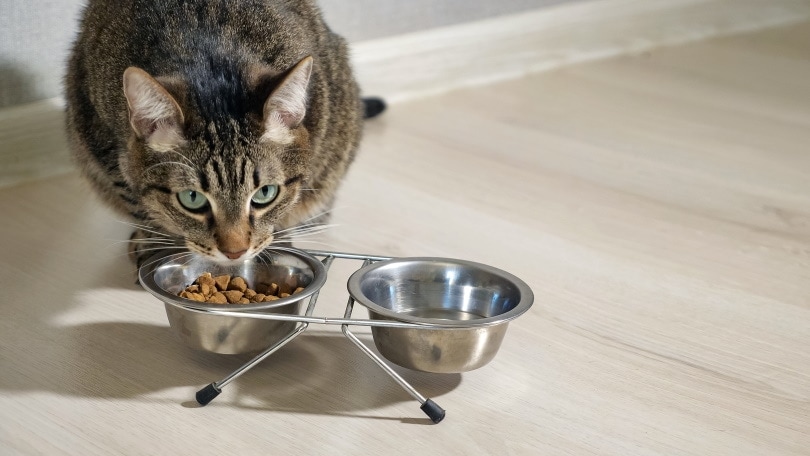
Causes of Stomach Sensitivities
Allergies
Food allergies often cause your cat to vomit and may also result in diarrhea. Food dyes and chemical ingredients are common causes of allergies in cats, but eggs, milk, and even chicken can cause problems for some pets.
If you have recently started feeding your cat a new food or treat, we recommend introducing it slowly. Start with only 10% mixed with 90% of their normal food. Keep increasing the percentage every few days until you eliminate the old food. We also recommend avoiding foods that tend to give cats problems, including beef, milk, and eggs. If you want to feed these foods to your cat, we recommend providing a small amount of the food without any other ingredients to see how it reacts. Always avoid raw food.
Expired Food
It’s easier than many people think to serve your cat expired food. It can often sit for longer than we would like, and even if the date on the bag says it’s still good, it will have a shorter shelf life if exposed to air. Expired food often results in vomiting and diarrhea.
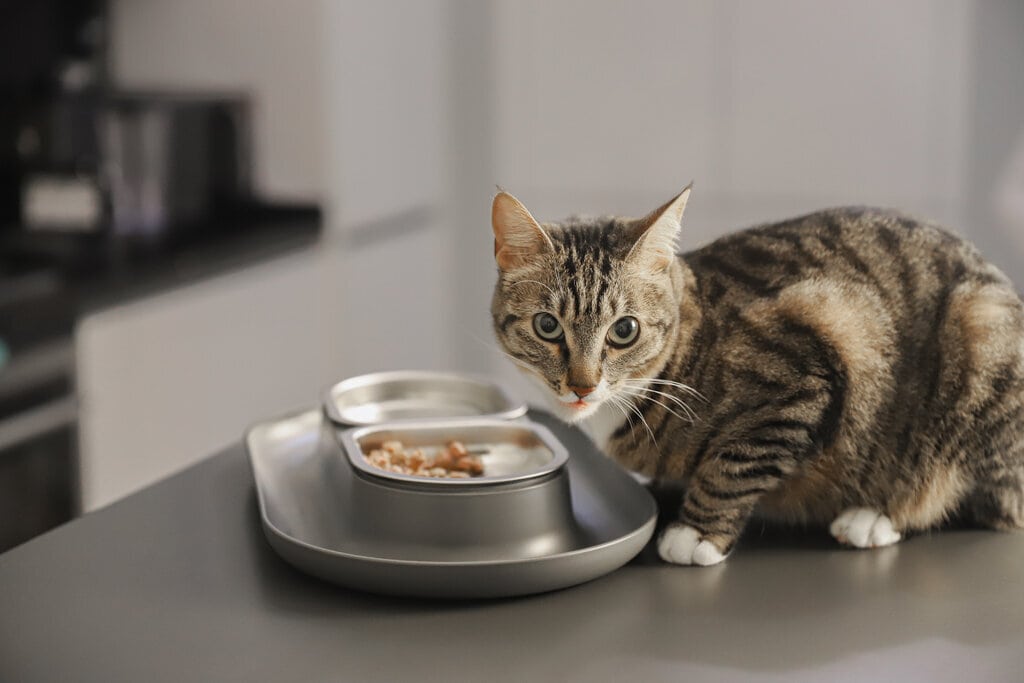
We recommend always checking the expiration date on the food before serving it, especially wet food because it can be stored for a long time. Tightly closing your dry food between each meal will help keep out humidity, preventing it from becoming stale.
Parasites
If you haven’t changed anything in your cat’s diet, but it suddenly begins having diarrhea or vomiting, there is a chance that your cat picked up a parasite, especially if it’s an outdoor cat.
If you notice unexplained vomiting and diarrhea in your cat and think a parasite could cause it, none of the foods on this list are likely to help, and we recommend taking your cat to the vet to have it looked at by a professional.
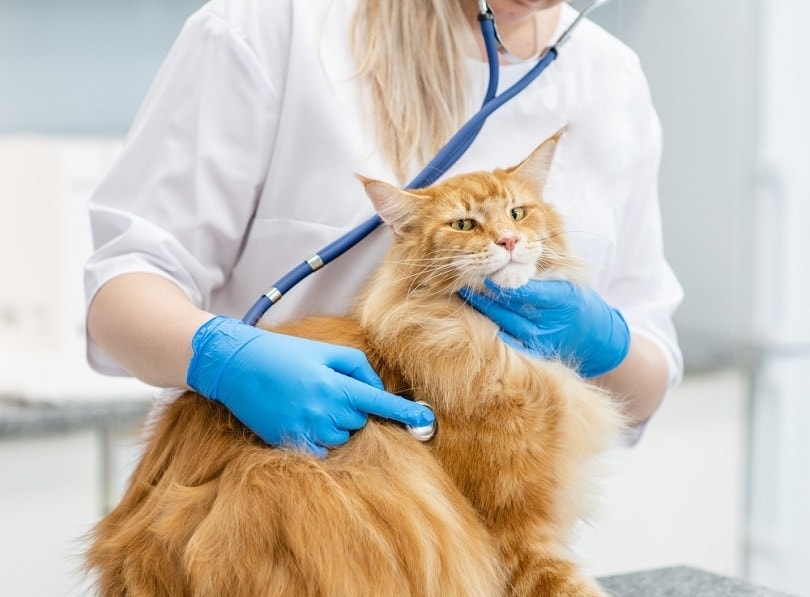
Foreign Materials
We all know that cats can get hairballs, but many people may not realize they are more common during the shedding seasons of spring and fall. Cats also tend to eat hair ties, wires, and other items that can collect in the stomach and cause vomiting.
We recommend inspecting the vomit to see if there is evidence of what’s causing it. Try to keep hair ties and similar objects out of reach of your cat. If it’s during the spring or fall, your cat might vomit more than usual to eliminate hairballs. You can groom your cat with a de-shedding comb to help cut down on the hair it ingests. There is also hairball medication you can use to help the hairballs pass more easily. If your cat continues to vomit, but nothing comes up, we recommend taking your cat to the vet to have it checked.
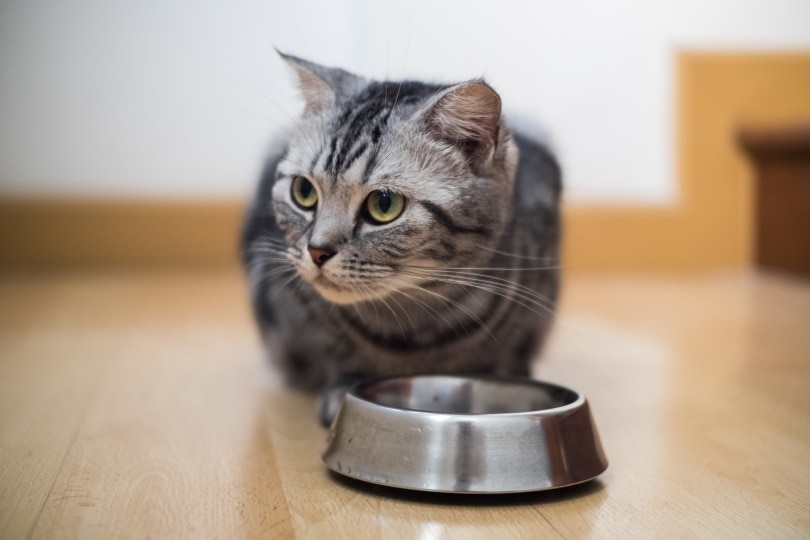
What Type of Food Should I Feed a Cat with a Sensitive Stomach?
- Limited-ingredient foods make it easier to find out what is disturbing the stomach of your cat.
- Avoid foods that contain dairy, as many cats are lactose intolerant.
- Cats are strict carnivores, so avoid foods that contain a lot of grain.
- Wet cat food tends to be quite rich compared to dry food and often results in soft stools and diarrhea. Dry food will also help keep your cat’s teeth clean.
- Look for brands that contain prebiotics and probiotics. These nutrients will help boost the good bacteria in your cat’s gut, giving it the tools, it needs to digest its food better and balance the digestive system. Stronger gut bacteria can also help boost the immune system.
- If you can’t figure out why your cat is having problems, check to see if any food contains artificial coloring, eggs, or chicken. It’s rare, but these ingredients can cause an allergic reaction in some cats.
- Avoid foods that contain BHA and BHT chemical preservatives.
- Choose foods that have real meat like turkey, chicken, or salmon listed as the first ingredient.
While providing our feline companions with high-quality food is paramount, selecting the right food and water bowl is equally important. The modern yet practical design of our Hepper NomNom Cat Bowl combines cat-catered features, like whisker-friendly shallow dishes and slight elevation, with a contemporary style aimed at protecting your floors from messy eating and drinking. The NomNom is entirely dishwasher safe and was thoughtfully created with your cat’s health and well-being in mind.
- NO MESS - The 360° tray on this cat food and water bowl set has a raised design to catch and...
- WHISKER FRIENDLY - Shallow and wide metal containers with flat bottoms ensure your kitty can enjoy...
Final Thoughts
When choosing the best cat food for sensitive stomachs, we recommend Smalls Fresh Ground Cow Food. It has plenty of protein and has beef listed as its first ingredient. It contains human-grade ingredients and no artificial flavors, preservatives, or colors. Another smart choice is our budget pick. Halo Holistic Seafood Medley Sensitive Stomach Dry Cat Food is inexpensive and features whitefish as its top ingredient. It also contains non-GMO fruits and vegetables designed for easy digestion to help provide your cat with a balanced diet.
We hope you have enjoyed reading these reviews and found a few brands you would like to try. If we have helped stabilize your cat’s digestive issues, please share this guide to the best cat foods for sensitive stomachs on Facebook and Twitter.
Related Read:
Featured Image Credit: Pixel-Shot-Shutterstock





